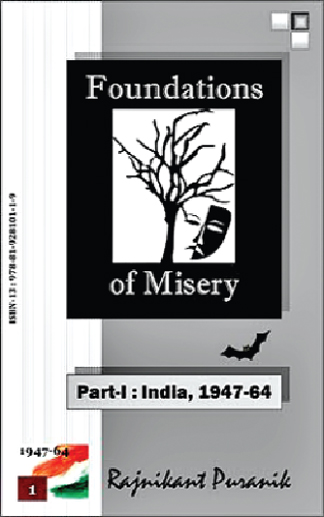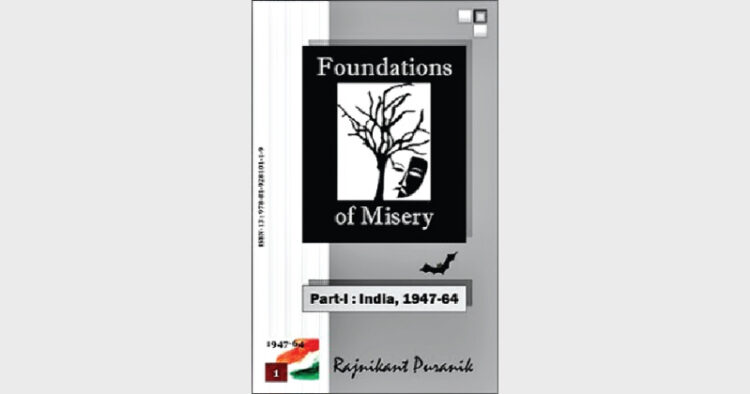 There is much that is not commonly known about the shocking aspects of the 1962 India-China War, so shocking indeed that S Gopal, Nehru”s official biographer, was constrained to comment: “Things went so wrong that had they not happened it would have been difficult to believe them.” The Henderson-Brooks report covered only the limited aspects their authors were tasked with. The book “Foundations of Misery” by Rajnikant Puranik in its chapter “Himalayan Misadventure” details all the aspects of that avoidable war. We are serialising that chapter.
There is much that is not commonly known about the shocking aspects of the 1962 India-China War, so shocking indeed that S Gopal, Nehru”s official biographer, was constrained to comment: “Things went so wrong that had they not happened it would have been difficult to believe them.” The Henderson-Brooks report covered only the limited aspects their authors were tasked with. The book “Foundations of Misery” by Rajnikant Puranik in its chapter “Himalayan Misadventure” details all the aspects of that avoidable war. We are serialising that chapter.
Sweep Under the Carpet
People feel shocked when they learn of the background and the details of the India-China War because under the cover of “national security interests” things have been hidden away from the public, despite such a long lapse of time.
Writes Brigadier JP Dalvi in Himalayan Blunder: “The people of India want to know the truth but have been denied it on the dubious ground of national security. The result has been an unhealthy amalgam of innuendo, mythology, conjecture, outright calumny and sustained efforts to confuse and conceal the truth. Even the truncated NEFA Enquiry [Henderson-Brooks Report] has been withheld except for a few paraphrased extracts read out to the Lok Sabha on 2nd September 1963. For some undisclosed reason, I was not asked to give evidence [despite being on the frontline during the war] before this body nor (to the best of my knowledge) were my repatriated Commanding Officers [Dalvi and others were taken prisoner by the Chinese and released in 1963].”
No democratic country remains so secretive. Both the UK and the USA, as also other democratic countries, make all official documents available after a lapse of certain years, as per their law, so that historians, academics, researchers, experts, leaders and others can study them. This helps writing of correct history, drawing proper conclusions, and learning lessons for the future. It helps countries learn and improve themselves. But, in India, the leaders and the bureaucrats are ever afraid of their incompetence and dishonesty being exposed. They are bothered about their present and their survival, the future of the country is not their business.
You ignore history and its lessons at your own peril and hence, to draw useful lessons for future from the debacle, it is necessary to raise uncomfortable questions.
Any democratic country, worth its salt, would have instituted a detailed enquiry into all aspects of the debacle: “What was the nature of the border dispute? Why the issue was not resolved through talks? Why didn’t India settle it in 1954 itself at the time of signing the Panchsheel? Was Indian position justified? Did Chinese arguments have substance? Why did India change its maps in 1954—on what grounds? Were there solid grounds for India to be so adamant on its stand? Why was the Chinese offer of a swap-deal on McMahon Line and Aksai Chin not accepted? Why was the forward policy adopted? Why the Indian defence preparedness was so poor? Had there been politicisation of the army? Why was the Indian performance in the war so pathetic? What should be India’s stand going forward? How to resolve the dispute? How to strengthen India’s defence?…”. Accountability should have been established and those responsible should have got their just desserts. The findings of the enquiry should have been made public, along with a road-map for the future. That’s democracy!
But, what happened in practice? Nothing! The government was brazen enough not to set up a comprehensive enquiry. Why let their own mistakes be found? Why punish themselves? Why be made to resign? Why vacate your positions? People don’t deserve to know! It was an autocratic democracy. Don’t disclose—cite “national interest”. Although, it was not national interest, but pure self-interest, that drove the decision. Sweep under carpet whatever is unpalatable. Just put all the blame on the Chinese and on a few scapegoats.
The above would be obvious from the following. During the lull in the war—October 24, to November 13, 1962—this is what Nehru said in the Rajya Sabha on November 9, 1962: “People have been shocked, all of us have been shocked, by the events that occurred from October 20 onwards, especially of the first few days, and the reverses we suffered. So I hope there will be an inquiry so as to find out what mistakes or errors were committed and who were responsible for them.” During the lull period India was making its preparations and those in power in Delhi were sure India would give a befitting reply to the Chinese. However, the subsequent war of November 14-20, 1962 proved even more disastrous. Sensing its consequence upon him, Nehru conveniently forgot about the enquiry.
(www.rkpbooks.com, www.facebook.com/fom.p1, rajnikantp.blogspot.in, twitter.com/Rajnikant_rkp, rkpuranik@gmail.com)?














Comments